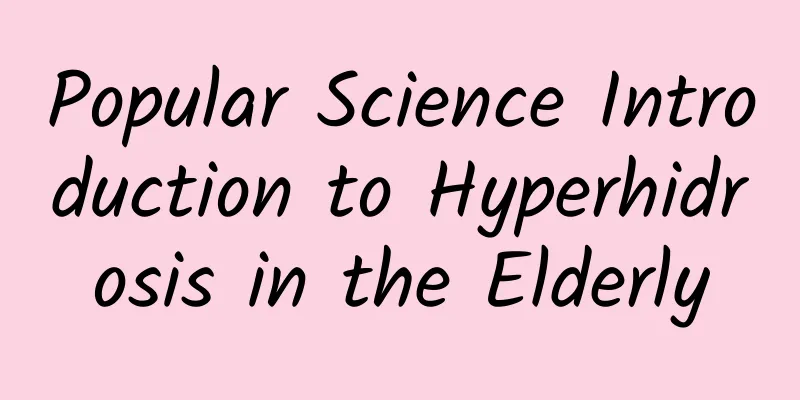Popular Science Introduction to Hyperhidrosis in the Elderly

|
Hyperhidrosis in the elderly is a common but easily overlooked disease, which is characterized by the amount of sweat on the skin far exceeding the normal level, causing many inconveniences to the lives of the elderly. Causes - Primary hyperhidrosis: mostly caused by autonomic nervous system regulation disorder, often symmetrical hyperhidrosis in the palms and soles, armpits, face and other parts, sweating aggravated by emotional excitement, elevated ambient temperature or after activities. - Secondary hyperhidrosis: often caused by other diseases, such as tuberculosis can cause night sweats, neurological diseases such as encephalitis, syringomyelia, Guillain-Barré syndrome, etc. can also cause hyperhidrosis symptoms. - Other factors: Some elderly people are prone to spontaneous sweating due to physical weakness and insufficient Qi and blood; some elderly people may have side effects from long-term use of certain drugs, leading to excessive sweating. Common symptoms - Localized hyperhidrosis: Common in the palms, soles, armpits, forehead and other parts. The sweat glands in these parts are more developed and the symptoms of hyperhidrosis are more obvious, such as frequent dampness in the palms and sweating on the soles of the feet leading to damp and smelly shoes. - Excessive sweating all over the body: Some elderly people will experience extensive excessive sweating all over the body. Even when they are quiet or the ambient temperature is suitable, they will sweat profusely. In severe cases, clothes may become soaked and need to be changed frequently. - Night sweats: abnormal sweating after falling asleep, which stops after waking up, often accompanied by hot flashes, irritability, dry mouth and other symptoms, mostly caused by Yin deficiency. Hazardous impact - Skin problems: Long-term excessive sweating can keep the skin moist, which can easily lead to skin diseases such as prickly heat rash, folliculitis, and intertriginous erythema. It can also increase the risk of skin infections, such as fungal infections. - Nutritional loss: Sweat contains sodium, potassium, calcium and other minerals and vitamins. Excessive sweating will lead to the loss of these nutrients, which may cause electrolyte disorders, malnutrition and other problems in the long term, affecting the health of the elderly. - Psychological impact: Hyperhidrosis may cause psychological problems such as inferiority and anxiety in the elderly, affecting their social activities and mental health, making them unwilling to participate in social occasions and gradually disconnecting from society. Diagnostic Methods - Detailed interview: The doctor will ask about the location, time, frequency, degree of sweating and associated symptoms, such as whether there is palpitations, hand tremors, fatigue, weight loss, etc., to preliminarily determine the cause of excessive sweating. - Physical examination: Perform a comprehensive physical examination on the patient, including measuring vital signs such as body temperature, blood pressure, heart rate, and checking skin condition to see if there are any skin lesions or other abnormal signs. - Laboratory tests: Depending on the patient's specific situation, blood routine, blood biochemistry, thyroid function, blood sugar and other tests may be performed to check whether hyperhidrosis is caused by endocrine disorders, metabolic disorders, infections and other diseases. - Special examinations: For some patients with hyperhidrosis of unknown etiology, some special examinations may be required, such as skin electrophysiological examination, sweat gland secretion function examination, etc., to further clarify the diagnosis. Treatment - Drug treatment: For primary hyperhidrosis, antiperspirants, anticholinergic drugs, etc. can be used for treatment; for secondary hyperhidrosis, treatment should be targeted at the primary disease, such as controlling blood sugar, treating hyperthyroidism, etc. In addition, Chinese medicine conditioning also has a certain effect, such as taking Yupingfeng Powder for hyperhidrosis of Qi deficiency type, and taking Liuwei Dihuang Pills for hyperhidrosis of Yin deficiency type. - Physical therapy: including iontophoresis, laser therapy, microwave therapy, etc., which can reduce sweating by destroying sweat glands or regulating the secretion function of sweat glands. - Surgical treatment: For patients with severe hyperhidrosis who are not well treated with medication and physical therapy, surgical treatment, such as thoracoscopic sympathectomy, can be considered, but the risk of surgery is high and needs to be carefully selected. Daily care and preventive measures - Keep your skin clean and dry: Take a bath and change clothes frequently, wipe off sweat in time, and avoid keeping your skin wet for a long time, which can effectively prevent the occurrence of skin diseases. - Wear breathable clothing: Choose cotton, breathable clothing to help sweat evaporate and dissipate, reducing skin discomfort. - Pay attention to diet: Eat a light diet, avoid spicy and irritating foods, eat more foods that have a sweat-retaining effect, such as yam, lily, floating wheat, etc., and you can also appropriately supplement foods rich in minerals such as calcium and potassium. - Moderate exercise: Appropriate physical exercise, such as walking, Tai Chi, yoga, etc., can enhance physical fitness, improve the body's immunity and regulatory ability, but be careful to avoid excessive exercise that causes excessive sweating. - Regulate your mood: Keep a good mood, avoid mental tension, anxiety, depression and other negative emotions, and relieve stress and regulate your mood by listening to music, reading, traveling, etc. In short, hyperhidrosis in the elderly cannot be ignored. Family members should pay enough attention and care, and take the elderly to see a doctor in time to make a clear diagnosis and take appropriate treatment measures. At the same time, the elderly themselves should also pay attention to daily care and prevention, maintain good living habits and mentality, and improve their quality of life. |
<<: Donating blood is a safe and meaningful gift of life
>>: What happens to people who wear headphones all year round? Do they really become deaf?
Recommend
Do ovarian cysts generally cause obesity?
The harm of ovarian cysts to female friends is im...
Women's cough is not good
Coughing is one of the most common symptoms. Coug...
Why do I have back pain when I'm pregnant?
Some pregnant women will experience back pain dur...
Can pregnant women eat Artemisia?
In some maternal and child books, it is not diffi...
[Medical Q&A] How should children’s diet be matched to ensure their healthy growth?
Planner: Chinese Medical Association Reviewer: Ch...
Can I have abortion at 55 days of pregnancy?
Nowadays, with the increasing pressure of people&...
Postpartum uterine recovery
For expectant mothers, their bodies are relativel...
How many types of vaginas are there in women?
A woman's vagina is a complex structure. Many...
What is the reason why leucorrhea is like paste?
If the leucorrhea is like paste, then women shoul...
Mugwort leaves for ovarian cysts
Polycystic ovary disease is a relatively common d...
The benefits of abstinence for women
The benefits of abstinence for women can improve ...
How to avoid getting drunk easily? What to eat before drinking to avoid getting drunk easily when there is no hangover medicine
What to eat before drinking to prevent getting dr...
Diet and reproductive health: Eat scientifically to have a better pregnancy!
Author: Zou Yaoyu Shanghai Ji'ai Genetics and...
What is the difference between placenta anterior and posterior?
The placenta is a tissue that wraps the baby. It ...
Debunking the rumor that you can’t dye your hair during menstruation
Regarding whether it is possible to wash hair dur...









